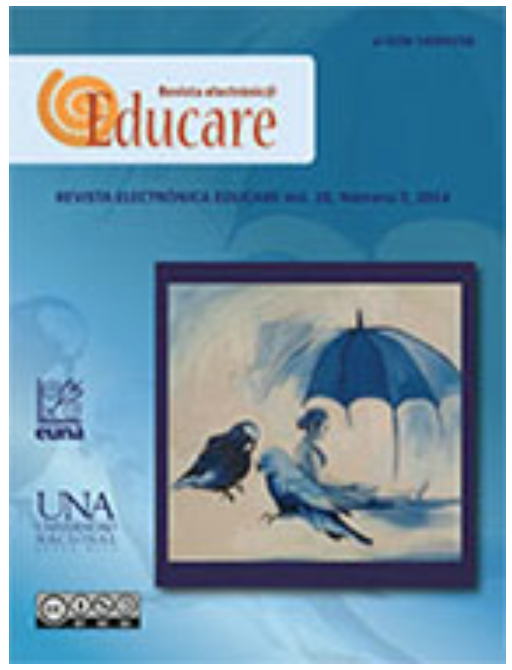Practice Teaching in Multicultural Contexts: Lessons to Training in Intercultural Teaching Skills
DOI:
https://doi.org/10.15359/ree.18-2.4Keywords:
Initial teaching training, teaching skills, intercultural education.Abstract
This paper presents the results of a research project entitled Teaching Exercises in Multicultural Contexts: Lessons to Training in Intercultural Teaching Skills, which was conducted during 2011-2012 by the Department of Teaching Research and Studies from the Costa Rican Ministry of Public Education (Escalante, Fernández and Gaete, 2012), in order to explore cultural diversity in classrooms and educational institutions in Costa Rica. This multicultural phenomenon has forced authorities to pay special attention to the educational services provided, particularly in elementary. In addition, it has sparked a discussion regarding the teachers’ conceptual and pedagogical void and a gap in their teaching skills to deal with student populations of different origins. Similarly, it leads to a reflection about the basic national educational curriculum. The research was conducted in 12 elementary schools from different educational districts, which have a high cultural diversity among students. Using qualitative research techniques, the opinions of principals, teachers and students regarding this topic are explored. The most important conclusion reached in this study is the absence of an intercultural pedagogy in the country’s classrooms and the need to prepare teachers in this respect.
References
Aguado, T. (2003). Pedagogía intercultural. Madrid: McGraw-Hill.
Aneas, M. A. (2005). Competencia intercultural, concepto, efectos e implicaciones en el ejercicio de la ciudadanía. Revista Iberoamericana de Educación, 35(5), 1-9. Recuperado de http://www.rieoei.org/deloslecIncluyetores/920Aneas.PDF
Araya, G. y Hernández, S. (2011). La interculturalidad en escuelas costarricenses con población migrante. Revista Actualidades Investigativas en Educación, 11(1)1-28. Recuperado de http://revista.inie.ucr.ac.cr/uploads/tx_magazine/interculturalidad-escuelas-costarricenses-araya.pdf
Artavia, C. y Cascante, L. (2007). Competencias de las y los docentes para la atención de la diversidad intercultural dentro del proceso edcuativo en el Liceo Otilo Ulate Blanco de San isidro de Alajuela (Tesis de maestría inédita). Universidad Nacional, Heredia, Costa Rica.
Campos, L., Castro, G., y Ceciliano, A. (2005). Estudios sobre la opinión de diversidad cultural de los niños y niñas de quinto grado de la escuela Juan Rafael Chacón ubicada en Boca Arenal, Cutris de San Carlos de Alajuela. (Tesis de licenciatura). Universidad Nacional, Heredia, Costa Rica.
Consejo Superior de Educación. (2008). El centro educativo de calidad como eje de la educación costarricense. Recuperado de http://dinamico.uned.ac.cr/ece/images/documents/doc2011_yrivera/un_centro_educativo_de_calidad.pdf
Coto, R., Ledezma, Y. y Vargas, K. (2009). Proyecto de estrategias metodológicas que puedan implementarse en el primer ciclo de la escuela de Santo Tomás de Santo Domingo de Heredia, para un abordaje de la diversidad cultural desde una perspectiva creativa (Tesis de licenciatura inédita). Universidad Nacional, Heredia, Costa Rica.
Escalante, C., Fernández, D. Gaete, M. (2012). Ejercicios docentes en contextos multiculturales: Lecciones para la formación en competencias docentes interculturales. San José, Costa Rica: MEP. Recuperado de http://www.mep.go.cr/sites/default/files/competencias_interculturales.pdf
García, F. J., Pulido, R. A. y Montes, Á. (enero-abril, 1997). La educación multicultural y el concepto de cultura. Revista Iberoamericana de Educación, 13. Recuperado de http://www.oei.org.co/oeivirt/rie13a09.pdf
Merino, J., y Muñoz, A. (mayo-agosto, 1998). Ejes de debate y propuestas de acción para una pedagógía intercultural. Revista Iberoamericana de Educación, 17. Recuperado de http://www.rieoei.org/oeivirt/rie17a07.htm
Moya, R. (enero-abril, 1997). Interculturalidad y reforma educativa en Guatemala. Revista Iberoamericana de Educación, 13, 129-155 Recuperado de http://www.rieoei.org/oeivirt/rie13a06.pdf
Nuñez, I. (2009). La adaptación de currículo a la diversidad cultural. Revista Iberoamericana de Educación, 49(2), 1-9. Recuperado de http://www.rieoei.org/deloslectores/2861Nunez.pdf
Poder Legislativo (23 de octubre de 2011). Decreto Nº 36451-MEP. La Gaceta Nº 48. Recuperado de http://www.gaceta.go.cr/pub/2011/03/09/COMP_09_03_2011.html#_Toc287347865
Rehaag, I. (marzo-abril, 2010). La perspectiva intercultural en la educación. El Cotidiano, 160, 75-83. Recuperado de http://www.redalyc.org/articulo.oa?id=32512766009
Vargas, M. (2011). Estrategias didácticas para la favorecer el desarrollo integral de niños y niñas de cuatro años, desde un enfoque de la educación intercultural, Cóbano Puntarenas. (Tesis de maestría), Universidad Nacional, Heredia, Costa Rica.
Downloads
Published
How to Cite
Issue
Section
License
1. In case the submitted paper is accepted for publication, the author(s) FREELY, COSTLESS, EXCLUSIVELY AND FOR AN INDEFINITE TERM transfer copyrights and patrimonial rights to Universidad Nacional (UNA, Costa Rica). For more details check the Originality Statement and Copyright Transfer Agreement
2. REUTILIZATION RIGHTS: UNA authorizes authors to use, for any purpose (among them selfarchiving or autoarchiving) and to publish in the Internet in any electronic site, the paper´'s final version, both approved and published (post print), as long as it is done with a non commercial purpose, does not generate derivates without previous consentment and recognizes both publisher's name and authorship.
3. The submission and possible publication of the paper in the Educare Electronic Journal is ruled by the Journal’s editorial policies, the institutional rules of Universidad Nacional and the laws of the Republic of Costa Rica. Additionally, any possible difference of opinion or future dispute shall be settled in accordance with the mechanisms of Alternative Dispute Resolution and the Costa Rican Jurisdiction.
4. In all cases, it is understood that the opinions issued are those of the authors and do not necessarily reflect the position and opinion of Educare, CIDE or Universidad Nacional, Costa Rica. It is also understood that, in the exercise of academic freedom, the authors have carried out a rogorous scientific-academic process of research, reflection and argumentation thar lays within the thematic scope of interest of the Journal.
5. The papers published by Educare Electronic Journal use a Creative Commons License:














 The articles published by Educare Electronic Journal can be shared with a Creative Commons License:
The articles published by Educare Electronic Journal can be shared with a Creative Commons License: 



